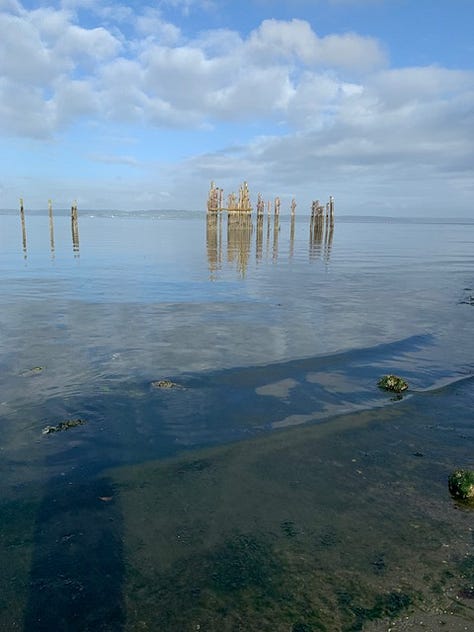

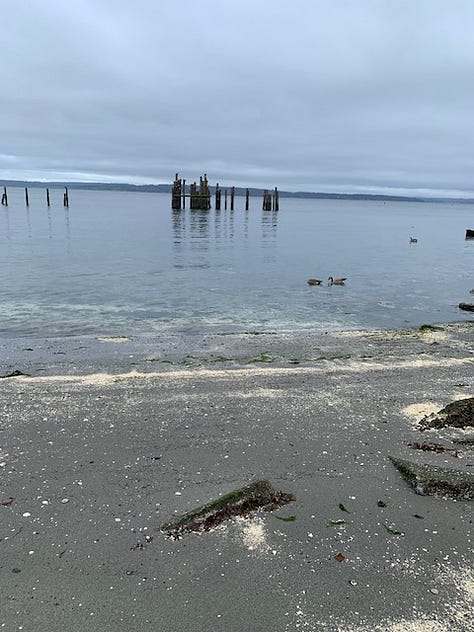
In a brand new springtime, maybe it was in my fifty-fifth springtime, I encountered the blossoms of the red currant bush tinged in their signature raspberry pink, fading to new green, dangling on green-yellow stems, while I tromped through the Cheasty Boulevard green space near my house on Beacon Hill in Seattle. Decades had passed since we, the plants and I, had met. Although I had changed, the red currant had not. The tender green native beauty seemed to whisper a greeting to me, “Hello! Old friend! Here I am, just as you have always known me and always will.” I responded, “And here you are, just as I have always known you.” And always will.
The beauty of the spring, more tender than ever, the quiet woods, the loamy ground, fallen branches, moldy decay, barely green buds, tangled underbrush, birdsong, an aroma fresh and rotten at the same time, recognized me, and I, it, in the rich present of now.
It’s easy to forget that we can in each moment of a season, of a year, of a month, of a day, of an hour, connect to an ageless, untouched, unchanged, immutable eternity. and encounter the joyful embrace. As Ram Dass1 admonished, “Be here now!”
Wow.
And so it was when I waded into the thick cold salt water of Puget Sound this past winter, and encountered the wow of my now, the connection, the joy, the indescribable peace of being where I am, now.
The little swimming beach is easy to miss, located in the midst of a very built-up and popular shoreline called Shilshole that faces west across Puget Sound. It’s barely four miles from my house. A ninety-five mile long body of water that borders Seattle to the West, Puget Soundis connected at the north to the big cold water of the Pacific Ocean via the Strait of Juan de Fuca. Puget Sound bottoms out near the state capitol, Olympia.
The native people of this immediate area were known as the Shilshole. They were Lushsootseed speaking, part of the Southern Coast Salish tribes and had resided nearby on Shilshole Bay since time immemorial. Shilshole Bay was connected to the bigger Puget Sound water via a tiny thread of river which provided the Shilshole peoples’ community some protection from the fierce marauding Coastal tribes ( Haida and Tlinget) from the north. The name Shilshole means ‘people who thread the needle’ or ‘threading the bead’, because of the narrow waterway access. The Shilshole’s habitat and waterway was destroyed in 1913 with the building of the Ballard Locks by the US Army Corp of Engineers.
The morning sea air was full of intoxicating salt and rot smells that late winter morning. I was alone on the beach except for the busy wildlife. As I stood on the carpet of crushed white clam shells and clumps of emerald green lettuce seaweed, the wavelets made soft ‘shhhhh-shhhhh’ sounds as they eased back and forth across the shore line.
If joy had a soundtrack this would be it, I thought.
Dressed in my black Speed-o swimsuit, neoprene skull cap and old lady beach shoes I summoned my fortitude and started to wade in. According to Lawrence of Arabia, as played by Peter O’Toole in David Lean’s movie spectacular, Lawrence of Arabia (1962), the trick to withstanding anything uncomfortable or painful is to pretend not to mind that the thing is uncomfortable or painful. Lawrence shares this trick by holding his hand over a lit match to the amazement of his office mates at British army headquarters in exotic Cairo. Taking a page from Sir Lawrence’s book, I assumed a stoic air, pulled on my cap and splashed myself with handfuls of frigid sea water. I did not acknowledge the water temperature. I was determined not to mind that it was freezing ass cold.
Meanwhile, the community of Purple Martins overhead, forever in a good mood, flitted in and out of their sanctuary village of suspended gourd-shaped birdhouses stationed on a stand of aging, barnacled, wooden pilings about seventy-five feet out from where I stood. On the adjacent rocky bulkhead stood a lanky-legged Blue Heron, fishing with laser-like focus on a point in the water before him.
I dove under.
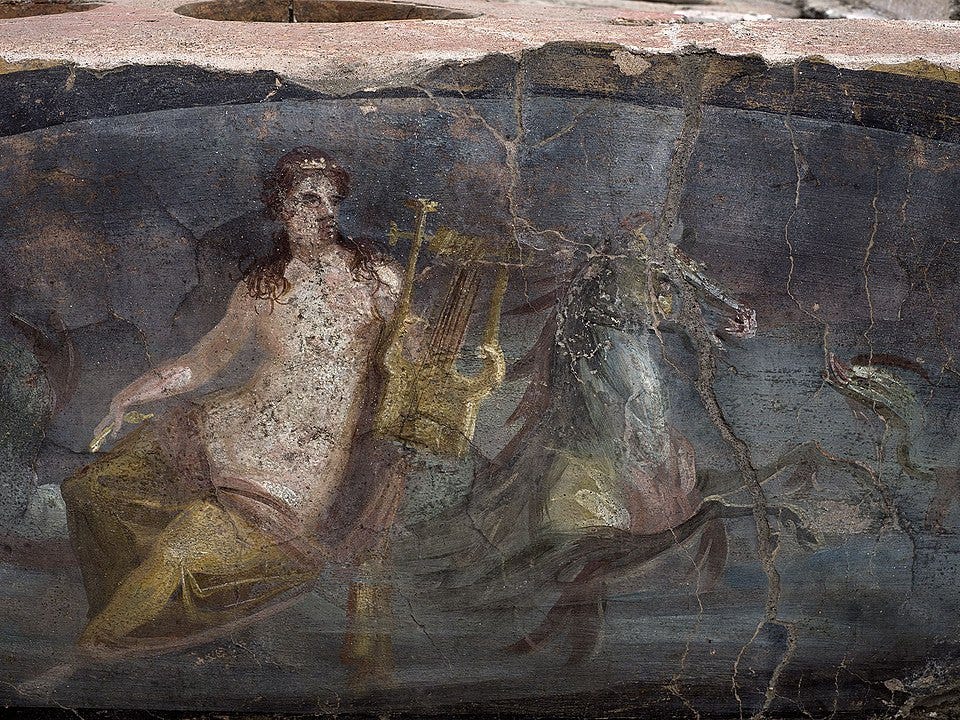
The salt water enveloped me in its cold thick 49°F. I propelled myself along the bottom in my best harbor seal style, through the murky underwater shadows, drifting seaweed strands and bright rays of sun. I snatched a white clam shell half off of the bottom and rocketed up through the surface for a breath.
All of my day-to-day apprehensions, tensions, stresses, doubts and worries, like accumulated road dirt on a windshield, were washed out to sea. Gone.
I flipped over onto my back and stared up at the sky, floating in the perfection of the moment. My thoughts - always busy with either my past or my future - floated off. The chronic tension in my neck and shoulder muscles, habitually tight from my pernicious screen habits, washed away. The Martins dived and swooped.
Still holding the clam shell in my hand I recalled how, as a young kid, on summer visits to Whidbey Island to Grandma’s cabin, we always went swimming in the late summer afternoon when the heat of the day was peaking. Our grandmother, Grace, was an ardent Puget Sound dipper, as was our mom. Eating sand, sitting at the water’s edge, turning over rocks, examining empty shells and swimming were basic, essential must -do’s of summertime living. Oh! and foraging for the hard-to-find Evergreen Blackberry.


When time came to swim, my twin-sister, Siri, and I thundered up the steep wooden cabin stairs to the attic, slid open the large western-facing mullioned window and leaned out to the shed roof below, on which our swimsuits were baking in the sun. We yanked them on, stiff with sand and salt, found our towels and raced across the sleepy beach front road to the water. Our Grandma followed in her suit and beach shoes, always wearing her white plastic swim cap with the chin strap and carrying her woven-grass mat and towel.
My sis and I each found a clam shell half and waded in. Standing chest deep in the cold we tossed our shells out as far as we could, then, dove under and sped through the sunshine rays, the murky shadows, lettuce seaweed, pieces of eel grass and the thick cold, to catch our shells before they hit bottom.
Once caught, you aimed for air, breaking the surface with a shout, “Got it!” Over and over and over we played our game. Ecstatically. And the dirt of the day was washed away.
Flipping over, I looked out to see the Blue Heron strike in the distance. I drew a deep breath and tossed my shell across the water, dove under and swam like hell searching ahead through the blur.
There it was, my shell, only half way to the bottom, drifting slowly downward with its familiar side-to-side sashay, just as it had drifted decades earlier. The shell glowed, its whiteness brilliantly exaggerated in the salty cold.
I recognized that light and caught it in my hand. As I broke through the water’s surface, tears started in my eyes.
Nothing changes. Everything changes. Purple Martins sing. I am old. I am young. Eternally.
In the wow of my now.
An American spiritual teacher and counter-culture figure, who wrote the famous book, Be Here Now, in 1971. https://en.wikipedia.org/wiki/Ram_Dass

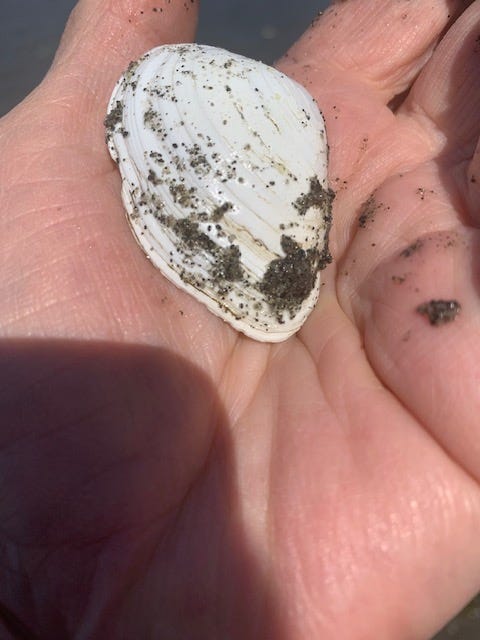
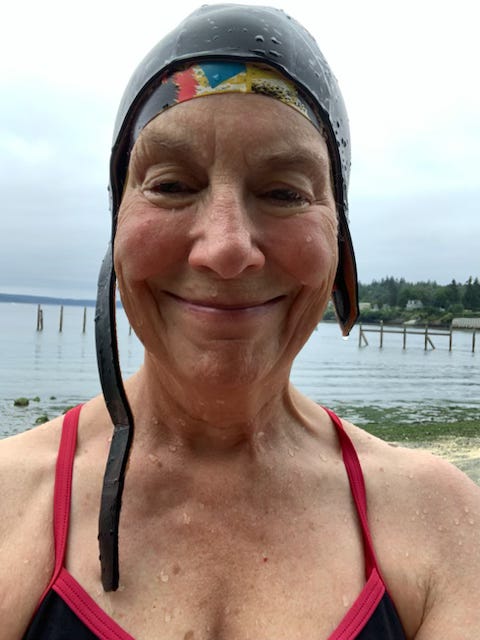
Love this, Karin!
I love this Karin! You capture the everlasting beauty and honor it is to live in this place. The real place. The Puget Sound where ghosts live, too.